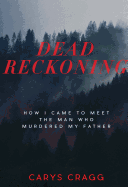
"I have no feelings of hate, rage, or anger toward you, but rather, I have a profound need to understand who you are, and what you were doing, so I can integrate that information into my life now." Nearly 20 years after her father was murdered, Carys Cragg writes this to his killer. Such letters, exchanged over two years, are part of her process of restorative justice, which focuses more on the people affected by a crime than its legal consequences. Cragg is a youth social worker in Canada, which no doubt increases her empathy, and she's acutely aware of the differences between her childhood and that of this man's, and the advantages he lacked.
Cragg's memoir, Dead Reckoning, follows their communication and eventual meeting. As she tries to find the truth about that horrible night, she discovers unexpected parallels in their families' pain. Much of the book is made up of their letters, which is at times tedious, but the decision to include so much of them--misspellings and all--is human and brave. Interspersed between chapters are third-person flashbacks of Cragg's life with and without her dad, a respected emergency doctor. Some of these moments almost seem too perfect, like a sitcom family settling down to dinner, until they are juxtaposed with the trauma her family endured. It's not a book about forgiveness, but rather a compelling and exceptional perspective on justice, taking control over your life and the unshakeable connection between people. --Katy Hershberger, freelance writer and publicist

